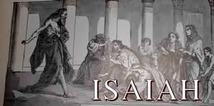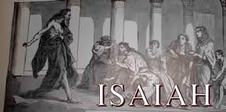
God the Word is still speaking at the top of 54--vs 1-5 speak of an increase in the descendants of Israel. Israel will not be left without heir because God Himself is the "husband" and "God of all the earth." 6-8 talk about God's relatively short forsaking of Israel in relation to His everlasting lovingkindness, but it's still hard to see. Considering the act of God's forsaking Israel (7) and an "outburst of anger" (8) is hard when we are tempted to only acknowledge the love of God and ignore what real love looks like in different situations; especially when you're talking about the great God of all the earth who is our Redeemer. We don't like to think of God doing something like having His servant die for the sins of others, but that's exactly what God the Word is saying will happen. Verses 9 & 10, like in all texts, cannot be removed from their context here. God's confession of His anger and forsaking of Israel just now is not here contradicted so much as it is related to the flood of Noah's time. The end is not annihilation, God's lovingkindness still continues and His compassion both prompts and tempers His anger toward sin. Israel's city will be established with precious stones and righteousness (11-12, 14), receive instruction from the Lord (13), and be protected from enemies because it's actually God who orders destruction and protection (15-16). No weapon is going to prosper against Israel and God will be the vindicator of His servants (17).






 RSS Feed
RSS Feed
